Contribution of Women Empowerment towards SME’s Development in India
67 Pages24691 Words2 Views
Added on 2022-12-29
About This Document
This document discusses the contribution of women empowerment towards the development of small and medium enterprises (SMEs) in India. It explores the role of women entrepreneurs in the economy and their impact on India's economy. The document also covers the conceptual framework and research methodology used in the study.
Contribution of Women Empowerment towards SME’s Development in India
Added on 2022-12-29
ShareRelated Documents
WOMEN EMPOWERMENT TOWARDS
SMALL AND MEDIUM ENTERPRISE’S
DEVELOPMENT IN INDIA: THE
CONTRIBUTION OF WOMEN IN
DEVELOPMENT OF INDIA'S ECONOMY
WITHIN SMALL AND MEDIUM SCALE
INDUSTRIES
SMALL AND MEDIUM ENTERPRISE’S
DEVELOPMENT IN INDIA: THE
CONTRIBUTION OF WOMEN IN
DEVELOPMENT OF INDIA'S ECONOMY
WITHIN SMALL AND MEDIUM SCALE
INDUSTRIES
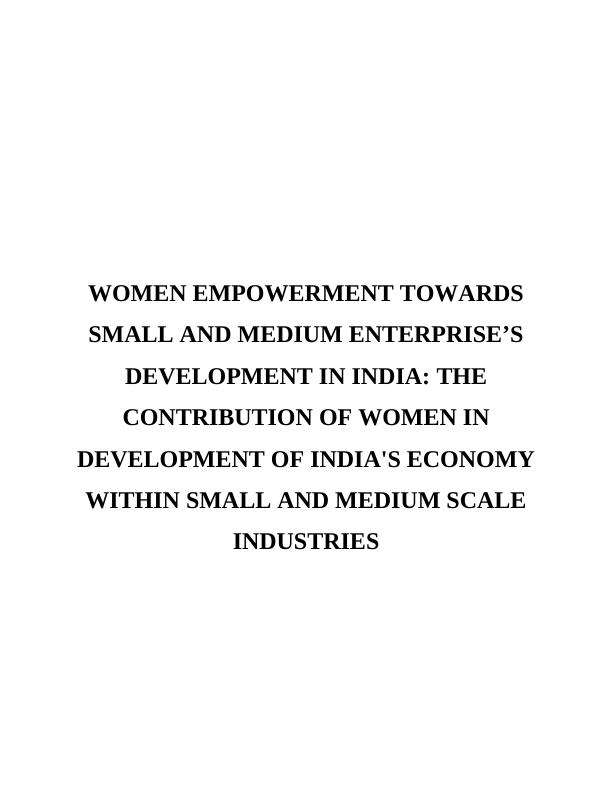
Table of Contents
Table of Contents.............................................................................................................................2
CHAPTER 4: CONCEPTUAL FRAMEWORK.............................................................................1
CHAPTER 5: RESEARCH METHODOLOGY.............................................................................3
5.1 Research philosophy.............................................................................................................4
5.1.1 Epistemology............................................................................................................8
5.1.2 Ontology...................................................................................................................9
5.1.3 Axiology.................................................................................................................10
5.2 Research approach..............................................................................................................12
5.2.1 Deductive approach................................................................................................12
5.2.2 Inductive approach..................................................................................................14
5.2.3 Abductive approach................................................................................................15
5.3 Research strategies..............................................................................................................16
5.3.1 Experiment..............................................................................................................17
5.3.2 Action research.......................................................................................................17
5.3.3 Case study...............................................................................................................18
5.3.4 Survey...................................................................................................................................18
5.3.5 Observation.............................................................................................................19
5.3.6 Grounded theory.....................................................................................................20
5.3.7 Interview.................................................................................................................20
5.4 Choice of data.....................................................................................................................22
5.4.1 Qualitative research................................................................................................23
5.4.2 Quantitative research..............................................................................................24
5.4.3 Mixed methods.......................................................................................................25
5.5 Research Design..................................................................................................................26
5.5.1 Descriptive research design....................................................................................26
5.5.2 Experimental research design.................................................................................28
5.5.3 Explanatory research design...................................................................................28
Table of Contents.............................................................................................................................2
CHAPTER 4: CONCEPTUAL FRAMEWORK.............................................................................1
CHAPTER 5: RESEARCH METHODOLOGY.............................................................................3
5.1 Research philosophy.............................................................................................................4
5.1.1 Epistemology............................................................................................................8
5.1.2 Ontology...................................................................................................................9
5.1.3 Axiology.................................................................................................................10
5.2 Research approach..............................................................................................................12
5.2.1 Deductive approach................................................................................................12
5.2.2 Inductive approach..................................................................................................14
5.2.3 Abductive approach................................................................................................15
5.3 Research strategies..............................................................................................................16
5.3.1 Experiment..............................................................................................................17
5.3.2 Action research.......................................................................................................17
5.3.3 Case study...............................................................................................................18
5.3.4 Survey...................................................................................................................................18
5.3.5 Observation.............................................................................................................19
5.3.6 Grounded theory.....................................................................................................20
5.3.7 Interview.................................................................................................................20
5.4 Choice of data.....................................................................................................................22
5.4.1 Qualitative research................................................................................................23
5.4.2 Quantitative research..............................................................................................24
5.4.3 Mixed methods.......................................................................................................25
5.5 Research Design..................................................................................................................26
5.5.1 Descriptive research design....................................................................................26
5.5.2 Experimental research design.................................................................................28
5.5.3 Explanatory research design...................................................................................28
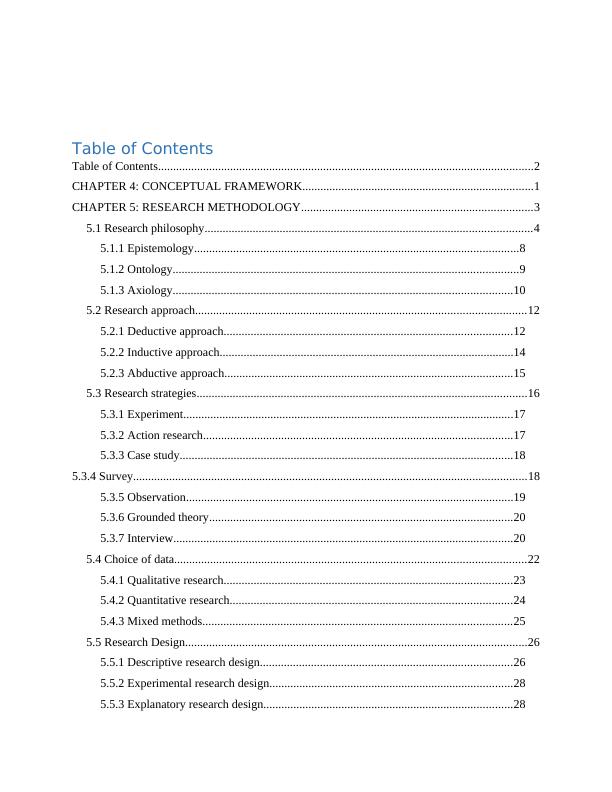
5.5.4 Correlation research design....................................................................................29
5.5.5 Diagnostic research design.....................................................................................29
5.6 Data collection....................................................................................................................31
5.6.1 Primary method of data collection..........................................................................31
5.6.2 Secondary method of data collection......................................................................33
5.7 Research Questionnaire Data Collection............................................................................35
5.7.1 Justification for the Use of Questionnaire..............................................................35
5.7.2 Questionnaire design..............................................................................................35
5.7.3 Design and Contents of Study’s Questionnaire......................................................36
5.7.4 Development of Questionnaire Guide....................................................................36
5.7.5 Reliability and validity of questionnaire.................................................................37
5.7.6 Questionnaire Pilot survey......................................................................................37
5.7.7 Questionnaire main study.......................................................................................37
5.8 Sampling.............................................................................................................................38
5.8.1 Probability sampling...............................................................................................38
5.8.2 Non- probability sampling......................................................................................40
5.9 Data Analysis......................................................................................................................41
5.9.1 Descriptive statistics...............................................................................................42
5.9.2 Inferential statics.....................................................................................................42
5.9.3 Text analysis...........................................................................................................42
5.9.4 Content analysis......................................................................................................42
5.9.5 Prescriptive analysis...............................................................................................43
5.9.6 Thematic analysis...................................................................................................43
5.9.7 SPSS.......................................................................................................................43
5.10 Validity and Reliability.....................................................................................................44
5.11 Ethical considerations.......................................................................................................45
5.11.1 Informed consent..................................................................................................45
5.11.2 Voluntary participation.........................................................................................46
5.11.3 Confidentiality......................................................................................................46
5.11.4 Anonymity............................................................................................................46
5.11.5 Do not harm..........................................................................................................46
5.5.5 Diagnostic research design.....................................................................................29
5.6 Data collection....................................................................................................................31
5.6.1 Primary method of data collection..........................................................................31
5.6.2 Secondary method of data collection......................................................................33
5.7 Research Questionnaire Data Collection............................................................................35
5.7.1 Justification for the Use of Questionnaire..............................................................35
5.7.2 Questionnaire design..............................................................................................35
5.7.3 Design and Contents of Study’s Questionnaire......................................................36
5.7.4 Development of Questionnaire Guide....................................................................36
5.7.5 Reliability and validity of questionnaire.................................................................37
5.7.6 Questionnaire Pilot survey......................................................................................37
5.7.7 Questionnaire main study.......................................................................................37
5.8 Sampling.............................................................................................................................38
5.8.1 Probability sampling...............................................................................................38
5.8.2 Non- probability sampling......................................................................................40
5.9 Data Analysis......................................................................................................................41
5.9.1 Descriptive statistics...............................................................................................42
5.9.2 Inferential statics.....................................................................................................42
5.9.3 Text analysis...........................................................................................................42
5.9.4 Content analysis......................................................................................................42
5.9.5 Prescriptive analysis...............................................................................................43
5.9.6 Thematic analysis...................................................................................................43
5.9.7 SPSS.......................................................................................................................43
5.10 Validity and Reliability.....................................................................................................44
5.11 Ethical considerations.......................................................................................................45
5.11.1 Informed consent..................................................................................................45
5.11.2 Voluntary participation.........................................................................................46
5.11.3 Confidentiality......................................................................................................46
5.11.4 Anonymity............................................................................................................46
5.11.5 Do not harm..........................................................................................................46
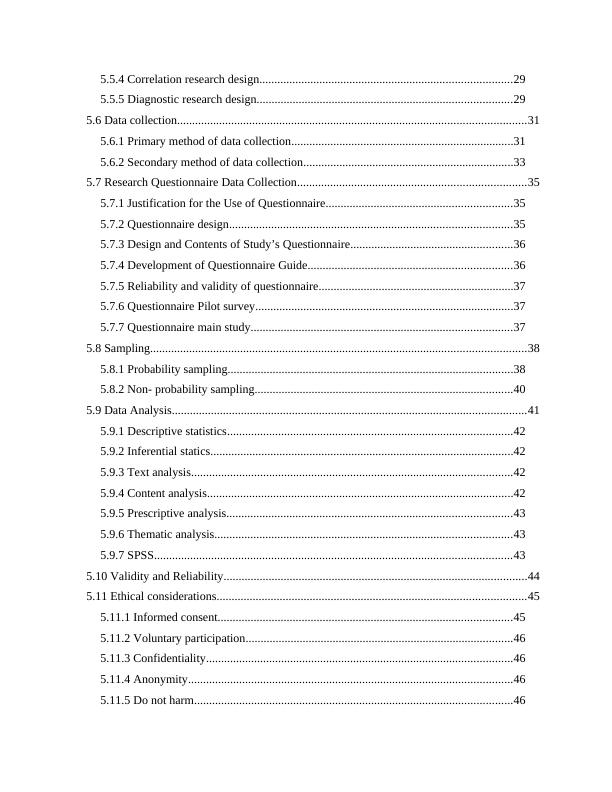
5.11.6 Only assess relevant components.........................................................................46
Questionnaire 1: Effectiveness of women entrepreneurs and their contribution......................48
Questionnaire 2: Role of women entrepreneurs in economy of country..................................54
Questionnaire 3: Contribution of women empowerment towards SME in Andhra Pradesh....56
REFERENCES..............................................................................................................................59
Questionnaire 1: Effectiveness of women entrepreneurs and their contribution......................48
Questionnaire 2: Role of women entrepreneurs in economy of country..................................54
Questionnaire 3: Contribution of women empowerment towards SME in Andhra Pradesh....56
REFERENCES..............................................................................................................................59

Title: Contribution of women empowerment towards SME’s development in India.
CHAPTER 4: CONCEPTUAL FRAMEWORK
Conceptual framework is related to women's empowerment towards SME development
in India. Empowerment in the development of a woman is a way of explaining, challenging, and
also overcoming barriers in life by which a woman enhances her ability to shape life. The
empowerment process will not only able to make improvements in their skills and also access to
be productive resources but succeed in increasing quality (Chatterjee, Gupta and Upadhyay,
2018). Empowerment consists of psychological and cognitive components for instance
understanding of woman of her subordination condition. Women empowerment is stage about
acquiring power for the women to understand their rights and perform responsibilities towards
others and themselves in an effective manner. Women empowerment is a necessary process for
the upliftment of the social, economic, and political status of women. It is an expansion about the
capabilities and assets of poor people to participate, negotiate with and influence the control.
Figure 1: Conceptual framework on Women empowerment
(Source: Women empowerment, 2021)
1
CHAPTER 4: CONCEPTUAL FRAMEWORK
Conceptual framework is related to women's empowerment towards SME development
in India. Empowerment in the development of a woman is a way of explaining, challenging, and
also overcoming barriers in life by which a woman enhances her ability to shape life. The
empowerment process will not only able to make improvements in their skills and also access to
be productive resources but succeed in increasing quality (Chatterjee, Gupta and Upadhyay,
2018). Empowerment consists of psychological and cognitive components for instance
understanding of woman of her subordination condition. Women empowerment is stage about
acquiring power for the women to understand their rights and perform responsibilities towards
others and themselves in an effective manner. Women empowerment is a necessary process for
the upliftment of the social, economic, and political status of women. It is an expansion about the
capabilities and assets of poor people to participate, negotiate with and influence the control.
Figure 1: Conceptual framework on Women empowerment
(Source: Women empowerment, 2021)
1
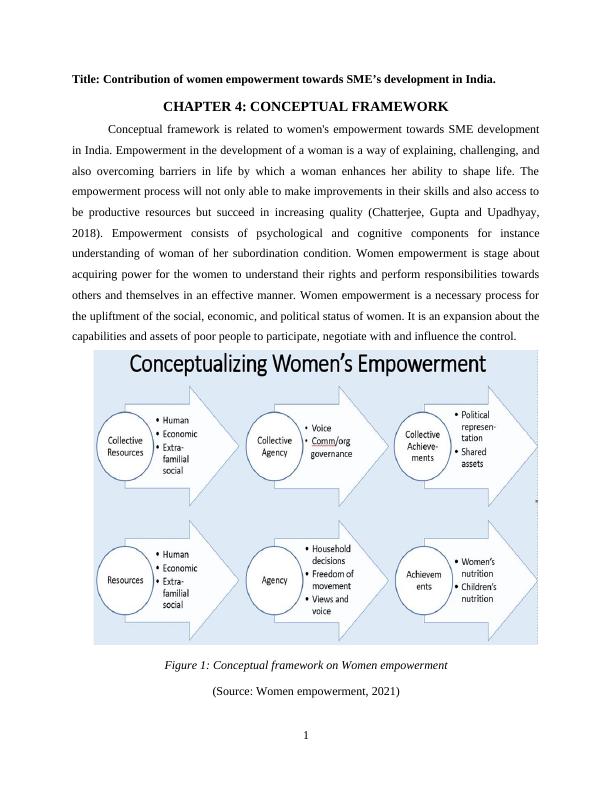
This conceptual framework related to women empowerment depicts the empowerment as
dynamic process in which woman acquire the resources. It enables women to develop the voice,
capacity to articulate the preferences, agency and fulfil own aspirations. The resources consist
human resources for an instance self-efficacy and skill development. Social resources are related
to the success to peer networks, participation in company and also access to the role models
outside family (Das, 2018). Other than this, economic resources are concerned with property,
land and earning. In context to this, resources enable but do not guarantee the empowerment due
to normative as well as wider structural environment in which women are grow up. From
theoretical viewpoint, ability of women to become empowered at individual level based on
environment in which she lives. This is necessary for the communities to change with respect to
opportunities for women, collective voice and norms about the gender.
2
dynamic process in which woman acquire the resources. It enables women to develop the voice,
capacity to articulate the preferences, agency and fulfil own aspirations. The resources consist
human resources for an instance self-efficacy and skill development. Social resources are related
to the success to peer networks, participation in company and also access to the role models
outside family (Das, 2018). Other than this, economic resources are concerned with property,
land and earning. In context to this, resources enable but do not guarantee the empowerment due
to normative as well as wider structural environment in which women are grow up. From
theoretical viewpoint, ability of women to become empowered at individual level based on
environment in which she lives. This is necessary for the communities to change with respect to
opportunities for women, collective voice and norms about the gender.
2
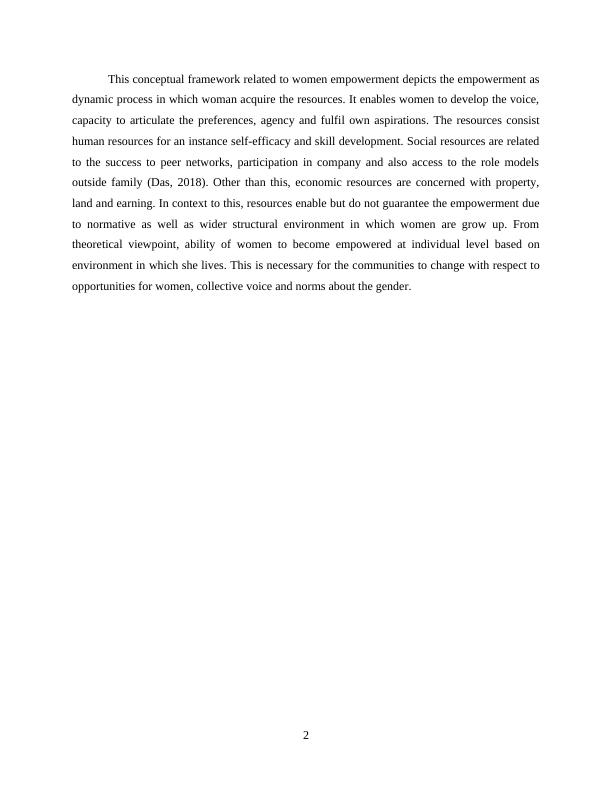
CHAPTER 5: RESEARCH METHODOLOGY
Research is explained as the creation of new knowledge and the use of the existing
knowledge in a creative way to generate new concepts, understanding and methodologies. It
could consist of analysis and synthesis of the previous investigation to an extent that leads to
effective outcomes. Research methodology is an important section of research as it provides a
framework in which investigators collect reliable data based on the specified research topic.
Basically, it is a path by which researcher needs to undertake an investigation in an appropriate
manner. As it shows the direction to investigator to formulate issues and objectives of specified
research. By this, researcher can easily acquire reliable data that assist in taking right and
meaningful data. Research methodology consists procedure through which an investigator goes
about work of explaining, defining ad predicting the phenomenon. It is study of the methods
through which knowledge can be gained effectively, aim of research methodology s to provide
work place of an investigation. This chapter discusses different research methods that were used
at the time of executing research activities (Datta and Sahu, 2017). Therefore, it is significant for
investigator to select an appropriate methods and technique to carry out the study so that valid
conclusion can be easily attained and also improve the possibilities of making it more reliable
and successful in nature. The research methodology is path by which an investigator requires to
conduct an investigation. This shows path by which these investigators develop problem and also
objective to present result from data that obtained during study period. In context to this,
research output is mainly accepted is underpinned through better research methodology that
gives clear description as well as analysis of data used in study and understanding research
findings in better manner. It is vital for researcher to select an appropriate research method as it
has direct impact on the overall results drawn. It is said that research methodology is basically a
part through which all the studies is conducted in a systematic and proper manner. In undertaking
the present investigation, variety of the research literature was effectively reviewed for purpose
of giving guide to enable an investigator to adopt the one or more than one methodology.
Research onion was developed through Saunders et. al., 2007 to explain stages by which
an investigator should pass when developing methodology. It consists the various layers to
research onion, premise being that begin from outside and peel each layer away until reach core.
The research onion consists different areas such as research philosophy, research approach,
research choices, research strategy and data collection procedure (Devarapalli, 2017). All the
3
Research is explained as the creation of new knowledge and the use of the existing
knowledge in a creative way to generate new concepts, understanding and methodologies. It
could consist of analysis and synthesis of the previous investigation to an extent that leads to
effective outcomes. Research methodology is an important section of research as it provides a
framework in which investigators collect reliable data based on the specified research topic.
Basically, it is a path by which researcher needs to undertake an investigation in an appropriate
manner. As it shows the direction to investigator to formulate issues and objectives of specified
research. By this, researcher can easily acquire reliable data that assist in taking right and
meaningful data. Research methodology consists procedure through which an investigator goes
about work of explaining, defining ad predicting the phenomenon. It is study of the methods
through which knowledge can be gained effectively, aim of research methodology s to provide
work place of an investigation. This chapter discusses different research methods that were used
at the time of executing research activities (Datta and Sahu, 2017). Therefore, it is significant for
investigator to select an appropriate methods and technique to carry out the study so that valid
conclusion can be easily attained and also improve the possibilities of making it more reliable
and successful in nature. The research methodology is path by which an investigator requires to
conduct an investigation. This shows path by which these investigators develop problem and also
objective to present result from data that obtained during study period. In context to this,
research output is mainly accepted is underpinned through better research methodology that
gives clear description as well as analysis of data used in study and understanding research
findings in better manner. It is vital for researcher to select an appropriate research method as it
has direct impact on the overall results drawn. It is said that research methodology is basically a
part through which all the studies is conducted in a systematic and proper manner. In undertaking
the present investigation, variety of the research literature was effectively reviewed for purpose
of giving guide to enable an investigator to adopt the one or more than one methodology.
Research onion was developed through Saunders et. al., 2007 to explain stages by which
an investigator should pass when developing methodology. It consists the various layers to
research onion, premise being that begin from outside and peel each layer away until reach core.
The research onion consists different areas such as research philosophy, research approach,
research choices, research strategy and data collection procedure (Devarapalli, 2017). All the
3
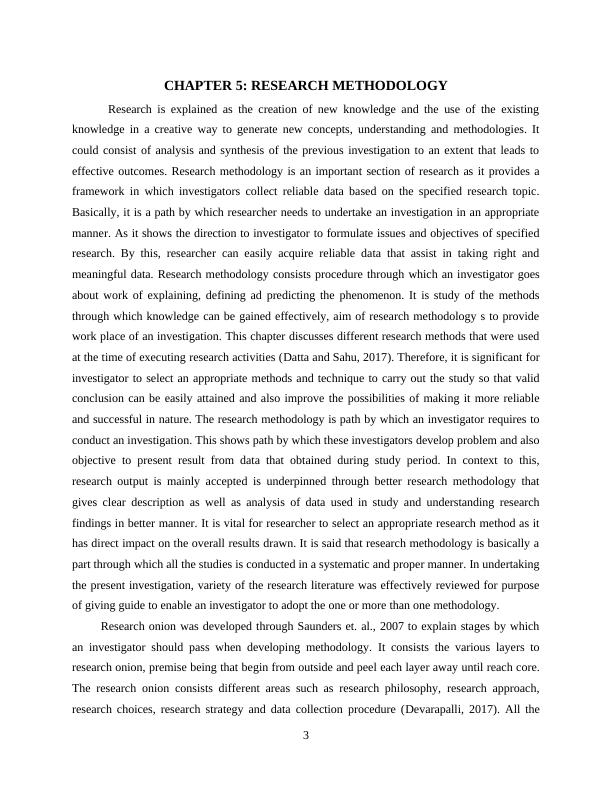
research methods are ideal for some parts of research methods components as they are fail to be
address key problems and are not effective to show methodology and related elements in logical
way. In context for an investigation to have the maximum credibility, there is a need to give
justifications and explanations for each level of the methodological decisions.
5.1 Research philosophy
It is the first layer in research onion as it is foundation of study and explains set of the
beliefs an investigation is built on. Research philosophy is all about way under which the data
regarding phenomenon should be collected and used. This deals with source and development of
the knowledge. This claims that social can be understood in objectives manner. Positivism
adheres to view that factual knowledge is mainly gained by the observation that consisting the
measurement. In this, role of an investigator is limited to collection of the data and also
interpretation in objective manner. Research philosophy is unique assistance to research in power
to determine as well as adapt research design and taking in to the consideration various
knowledge structure (Eswarappa, 2020). On the other hand, underlying the research philosophy
is mainly used at the time of research work that predicted on necessary assumptions regarding
worldview of an investigator. It is important for researcher to adopt appropriate research
philosophy so that an effective and valid conclusion is drawn in a proper manner. Significance
of having the better research philosophy cannot have underplayed amongst reason for this are
that this assists to be clarify the research design and dealing with kind of data required. An
effective research philosophy background is helpful to an investigator to understand which of
research designs work in better manner. It underlying the assumptions work in such a manner
that they identify research methods and strategies. Research philosophy is unique assistance to an
investigation to determine as well as adapt research design. It is taking into consideration various
knowledge structures and limiting factors. This can helpful to inherent knowledge of an
investigator to develop design outside own experience of an investigator. This assists to shape
frontiers of an investigation that is being conducted. the selected research philosophy in some of
the other research methodology aspects will be mainly used to realistically situate contributions
of an investigation in business area. It is vital for researcher to select an appropriate research
method as it has direct impact on the overall results drawn. It is said that research methodology is
basically a part through which all the studies is conducted in a systematic and proper manner. It
is important for researcher to adopt appropriate research philosophy so that an effective and valid
4
address key problems and are not effective to show methodology and related elements in logical
way. In context for an investigation to have the maximum credibility, there is a need to give
justifications and explanations for each level of the methodological decisions.
5.1 Research philosophy
It is the first layer in research onion as it is foundation of study and explains set of the
beliefs an investigation is built on. Research philosophy is all about way under which the data
regarding phenomenon should be collected and used. This deals with source and development of
the knowledge. This claims that social can be understood in objectives manner. Positivism
adheres to view that factual knowledge is mainly gained by the observation that consisting the
measurement. In this, role of an investigator is limited to collection of the data and also
interpretation in objective manner. Research philosophy is unique assistance to research in power
to determine as well as adapt research design and taking in to the consideration various
knowledge structure (Eswarappa, 2020). On the other hand, underlying the research philosophy
is mainly used at the time of research work that predicted on necessary assumptions regarding
worldview of an investigator. It is important for researcher to adopt appropriate research
philosophy so that an effective and valid conclusion is drawn in a proper manner. Significance
of having the better research philosophy cannot have underplayed amongst reason for this are
that this assists to be clarify the research design and dealing with kind of data required. An
effective research philosophy background is helpful to an investigator to understand which of
research designs work in better manner. It underlying the assumptions work in such a manner
that they identify research methods and strategies. Research philosophy is unique assistance to an
investigation to determine as well as adapt research design. It is taking into consideration various
knowledge structures and limiting factors. This can helpful to inherent knowledge of an
investigator to develop design outside own experience of an investigator. This assists to shape
frontiers of an investigation that is being conducted. the selected research philosophy in some of
the other research methodology aspects will be mainly used to realistically situate contributions
of an investigation in business area. It is vital for researcher to select an appropriate research
method as it has direct impact on the overall results drawn. It is said that research methodology is
basically a part through which all the studies is conducted in a systematic and proper manner. It
is important for researcher to adopt appropriate research philosophy so that an effective and valid
4
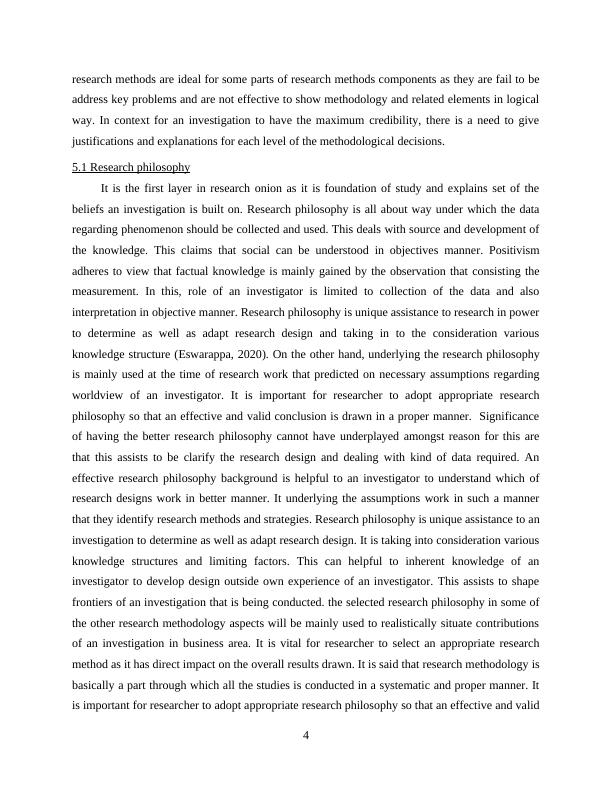
End of preview
Want to access all the pages? Upload your documents or become a member.
Related Documents
Managing International Businesslg...
|69
|20400
|72
Women Empowerment towards SME Development in Indialg...
|268
|90107
|149
STRM044 : Business Research Projectlg...
|70
|15996
|60
Analyze the leadership qualities required in the constructionlg...
|101
|20074
|5
XXX in China: Marketing Strategies for Expansionlg...
|68
|16736
|25
Digital Business Models towards More Sustainable Values by Technology and Big Datalg...
|86
|16619
|290
